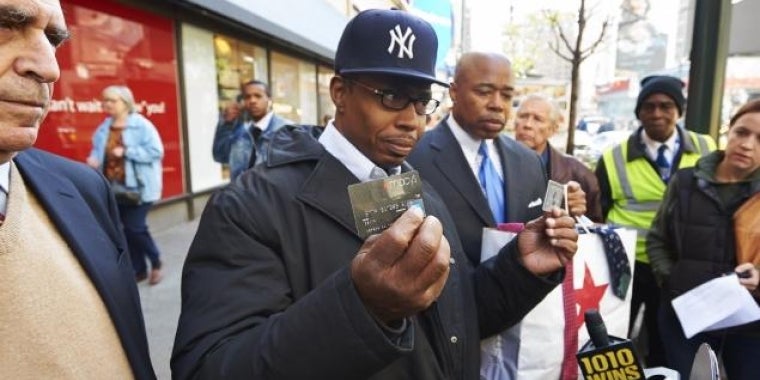
Senator Adams Unveils Legislation To Improve Gun Crime Tracking Methods
New York.- New York State Senator Eric Adams (D-Brooklyn) announced today two bills to improve efforts in the prevention and prosecution of gun-related crime through novel ammunition tracking and registration methods. Senator Adams was joined by New York State Senate Democratic Leader Malcolm A. Smith, state senators Eric T. Schneiderman and John Sampson, law enforcement representatives and community leaders, at the corner Huston and McDougal Street in Manhattan.
One bill would permit the sale of bullets only to individuals who hold legal gun licenses that specify the type of ammunition being purchased, and it would make the illegal sale of ammunition a Class C felony. A second bill would require that manufacturers brand bullets sold in New York with a traceable code to help police quickly gather invaluable data during time-sensitive criminal investigations.
The ammunition coding legislation also includes a provision requiring the State Division of Criminal Justice Services to maintain an Ammunition Coding System Database containing bullet coding information obtained from manufacturers and vendors in an effort to create a stronger link between evidence compiled at a crime scene and the individual who purchased the ammunition.
"With a more direct tracking system, such as the one I am proposing, we can help law enforcement officials connect the dots much more quickly and efficiently in crime investigations where every minute counts," said Senator Adams, a retired City police officer.
New York State Senate Democratic Leader Malcolm A. Smith said: "While we still mourn the irrevocable loss of our two auxiliary police officers, Nicholas Pekearo and Yevgeniy 'Eugene' Marshalik, it is appropriate to take every measure to make gun crimes harder to commit and easier to solve and punish." Senator Smith added, "Like they did with these young voluntary officers and the pizzeria worker Alfredo Romero, each bullet is capable of ending a life and the legislative package sponsored by Senator Adams and my colleagues would make these bullets quickly identifiable and make it easier for the law enforcement community to do its job."
The two bills were introduced in the same week that a gunman opened fire during a shooting spree in Manhattan on March 14, killing an employee at a pizzeria and, minutes later, two unarmed volunteer police officers. The assailant had been carrying two guns and over 100 rounds of ammunition, according to published reports.
Though in this case armed police officers responding to the scene ultimately shot and killed the perpetrator before any other individuals were harmed, Senator Adams noted that according to U.S. Department of Criminal Justice data there is a greater than 30 percent chance that police will never find a killer in homicides involving a firearm.
"First and foremost, my heart goes out to the families of those who were killed in such a brutal, heartless fashion," said Senator Adams of this past week's events. "Do we need any more reminders that our failure to effectively regulate the distribution and sale of firearms leads directly to the kind of horror we recently witnessed inManhattan?"
"Though individuals are the ones who ultimately commit crime, it is our flawed gun control policy that tragically leaves far too many doors wide open for individuals to act upon their intent to kill," Adams noted.
New York State Senator Eric Shneiderman said: "This incident shows why we need to close the legal loopholes that enable gun dealers to sell firearms to violent criminals and straw purchasers. We can not claim to have affective safety laws when people like David Garvin are able to engage in shooting spree in our community." Senator Schneiderman is the sponsor of Senate bill S2404, the Gun Dealers Responsibility Act, which requires strict record keeping and reporting by gun dealers and training of their employees to prevent criminals from obtaining illegal guns.
State law currently requires that firearm vendors provide law enforcement officials with a sample bullet fired from every gun sold. The process is called "ballistic fingerprinting," in which a bullet is inscribed with a unique pattern – much like a fingerprint – as it advances through the gun barrel. The pattern information, kept on file, can later be matched to the gun that fired it and, in many cases, the person who pulled the trigger.
Senator Adams noted, however, that the system has several shortcomings. For instance, in the case of guns sold illegally, or those that change hands multiple times, data supplied by legal firearms vendors may not provide a conclusive link between crime scene evidence and the perpetrator, who may not be the same person who originally purchased the gun.
"Certainly 'ballistic fingerprinting' has helped police solve many cases in recent years, especially in instances where the weapon is later found and a match made, but this is not always possible," Senator Adams said.
"Moreover, in the criminal underworld, where firearms are routinely bought, sold, and exchanged at a dizzying pace, we cannot rely on the possibility of the existence of a close relationship between the individual who buys a gun legally at a licensed shop and the person who later uses that same gun to commit a violent crime," he added. "There are simply far too many degrees of separation, not to mention the prevalence of weapons that have no traceable legal origin."
"By 'fingerprinting' the ammunition, not the firearm, we can identify a closer relationship between the person who committed the crime and the individual whose name is associated with the bullet, which is never absent from the crime scene," Senator Adams concluded.


